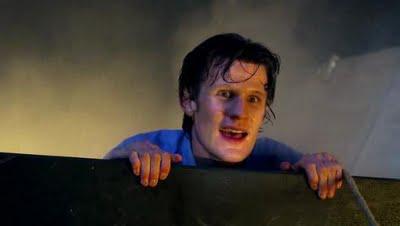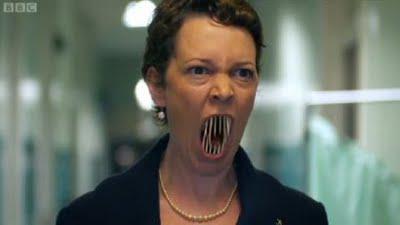I had anticipated Steven Moffat hitting the ground running as creative head of Doctor Who; were I to list the 10 best episodes of New Who, all of his penned episodes would make the cut. As I've said in previous Who posts, Moffat's style combines wit, edginess and an atmosphere that relies on suggestion over confrontation to unsettle the audience. His approach was an antidote to the sometimes cloying sentimentality of Russell T. Davies, who stuck to the child-oriented side of the program while Moffat gave kids something to think and fret about.
What I did not expect is that Moffat would find a new Doctor who could communicate the same things through his body language and delivery. Like those who saw this transition happen in real time, I felt sad to see David Tennant go. He was so effortlessly charismatic, so capable of pulling off whatever the writers required of him, that he left his successor big shoes to fill. Matt Smith, however, proves instantly that he's not only capable of the task but perfect for a Moffat-run Who.
When he crashes in his wrecked TARDIS outside the large but rotting home of wee Scottish transplant Amelia Pond, the still-transforming Doctor displays a complete personality shift from his predecessor. If the Tenth Doctor's catchphrase was "Allons-y," the Eleventh's might as well be, "Oh, would you come on, already?" It's not that he's hostile, per se, only so removed from others that his directness can seem edgy. Davies' conception of the Doctor always made him sound as if he'd like nothing more than to be a human; Moffat's Doctor appears to be just fine being a superior creature, thank you very much.

"The Eleventh Doctor" is so simultaneously funny and terrifying (and, occasionally, heartbreaking) that it instantly raises the bar for the series. As the Doctor notes (among frantically and rudely demanding different foods to test his new taste buds), Amelia's calm toward an alien who fell from the sky commanding her must make the crack in her bedroom she fears truly scary. And God is it; it's like the ragged gash from Roman Polanski's Repulsion, a subtly expanding fissure concealing the escape of a prisoner from a cross-dimensional prison.
I'm going to try to stop summarizing there, because if I don't I'll never stop. Like "The Girl in the Fireplace," another Moffat episode, "The Eleventh Hour" splits time between two relative points; the Doctor heads into the split to investigate the prisoner breakout and returns five minutes later, only to find that 12 years have passed and the wide-eyed girl is now a bitter young woman scarred by teases and analysis over her insistence of a "raggedy doctor" who visited her as a child. Amelia, now "Amy," feels anger over sadness, and we see the Doctor's edge reflected in her.
If Smith quickly proves himself in this episode, Karen Gillan does as superb a job in carving out her own territory from previous Companions. She's sharp-tongued, but not in Donna's bromantic sense; Tate formed a solid double act with Tennant, but there's tension between the Doctor and Amy I haven't really seen so far, familiar only with New Who and thus of two romantic Companions and one Laurel and Hardy-esque situation. Amy captures the best of both, still wounded from the pain the Doctor indirectly caused her but intrigued in more ways than one about him. When the Doctor strips before Amy and her fiancé, Rory, she keeps watching, even responding to Rory's snippy question of whether she's going to turn away with a curt, "Nope." Frankly, I'm as interested in seeing how Amy grows as the Doctor.
As far as monsters go, Moffat has always preferred the suggestion of terror punctuated by the fleetest glimpses of full-on, pants-wetting horror. Small wonder, then, that the escaped prisoner is a creature that eludes capture by taking on other forms and manages to remain unseen in its natural form by lingering in the corner of one's eye. Even when all seems to be calm, the slightest flicker of discrepancy grows in the mind until HOLY JESUS WHAT IN THE NAME OF—

There are inherent setbacks to Doctor Who: its family-friendly format and modest budget can only accommodate a certain range of ambition. "The Eleventh Hour" is one of the few episodes, particularly coming off the incredibly uneven Davies years, that really shows what the series can be capable of; its wit—"You're Scottish, fry something"—, suspense and rich characterization (both the Eleventh Doctor and Amy emerge so fully formed this series debut never feels like your basic establishing episode) make for a truly stellar episode of television. Considering just how much was reset this series, as much was at stake with this episode as Davies' resurrecting pilot. But unlike the gradual piecing together of new characters and hinted arcs that defined Davies' largely underwhelming series openers, Moffat's does not set the groundwork for better episodes later. It is simply great TV, fully realized while still tantalizing the audience with promises of further growth. I'm in love all over again.

